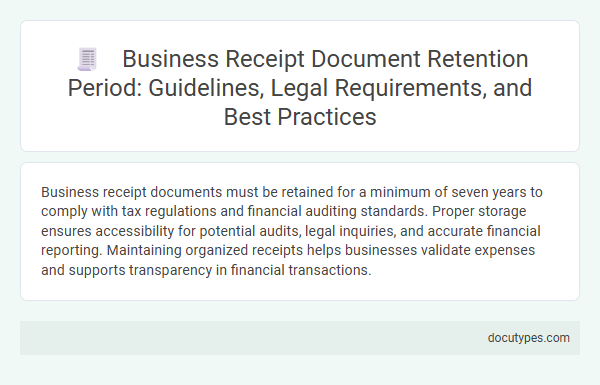Business receipt documents must be retained for a minimum of seven years to comply with tax regulations and financial auditing standards. Proper storage ensures accessibility for potential audits, legal inquiries, and accurate financial reporting. Maintaining organized receipts helps businesses validate expenses and supports transparency in financial transactions.
Introduction to Business Receipt Document Retention
Business receipt documents serve as essential records for transactions and financial tracking. Proper retention of these receipts ensures compliance with legal and tax regulations.
You must retain business receipt documents for a specific period, usually defined by tax authorities. This retention period helps protect your business in case of audits or financial reviews.
Importance of Retaining Business Receipts
Business receipt documents must be retained for a minimum of 3 to 7 years, depending on tax laws and regulatory requirements. Retaining receipts is crucial for accurate financial reporting, tax audits, and verifying business expenses. Your organized records help ensure compliance and protect against potential legal or financial disputes.
Legal Requirements for Receipt Retention
Business receipt documents must be retained according to specific legal requirements to ensure compliance with tax and financial regulations. The retention period varies by jurisdiction but generally ranges from 3 to 7 years.
In the United States, the Internal Revenue Service (IRS) mandates that businesses keep receipts for at least 3 years to support tax deductions and credits. Some states may require longer retention periods, up to 7 years, especially in cases of audits or disputes. Proper documentation helps protect businesses from legal penalties and supports accurate financial reporting.
Industry-Specific Receipt Retention Guidelines
Businesses must adhere to industry-specific receipt retention guidelines to ensure compliance with legal and financial regulations. Retail, healthcare, and construction sectors often have distinct requirements based on transaction types and auditing standards.
Retail businesses typically retain receipts for 3 to 7 years to satisfy tax and warranty claims. Healthcare industries may require retention periods extending up to 10 years to comply with patient record laws and insurance audits.
IRS and Tax Authority Receipt Retention Rules
| Retention Period | Description | Relevant Authority |
|---|---|---|
| 3 Years | Minimum period to keep receipts for items reported on tax returns under IRS rules | Internal Revenue Service (IRS) |
| 7 Years | Retention for receipts relating to claims for loss from worthless securities or bad debts | IRS |
| 7 Years | Recommended period for maintaining receipts in case of audit or dispute regarding deductions | IRS |
| Indefinite | Receipts for property or asset purchases should be kept for as long as the asset is owned plus 3 years after sale | IRS |
| Varies by Jurisdiction | State and local tax authorities may have different retention requirements for business receipts, often ranging from 3 to 7 years | State and Local Tax Authorities |
| Digital Copies | IRS accepts digital receipt copies if properly stored and retrievable during the required retention period | IRS |
Best Practices for Storing Business Receipts
The required retention period for business receipt documents typically ranges from three to seven years, depending on tax regulations and business needs. Proper storage of these receipts ensures accuracy in financial reporting and facilitates audits.
- Maintain Digital Copies - Scanning receipts and storing them securely helps prevent loss and allows easy access when needed.
- Organize by Date and Category - Categorizing receipts by month and expense type streamlines retrieval and bookkeeping processes.
- Use Fireproof and Secure Storage - Physical copies should be kept in a fire-resistant safe or secure location to protect against damage or theft.
Following these best practices will help you comply with legal requirements and maintain accurate financial records.
Recommended Receipt Retention Periods
What is the recommended retention period for business receipt documents? Businesses are advised to retain receipt documents for a minimum of seven years. This duration aligns with tax regulations and audit requirements to ensure compliance and accurate record-keeping.
Digital vs. Paper Receipt Retention
Business receipt documents must be retained according to legal requirements, typically ranging from 3 to 7 years depending on jurisdiction and tax regulations. Digital receipts offer advantages in storage efficiency and ease of access but must comply with digital record-keeping standards and authenticity verification. Your choice between digital and paper receipt retention impacts compliance, with digital copies often preferred for long-term preservation and audit readiness.
Consequences of Improper Receipt Retention
Maintaining proper retention periods for business receipt documents is essential to ensure regulatory compliance and accurate financial record-keeping. Failure to retain receipts appropriately can lead to significant legal and financial repercussions.
- Penalties and Fines - Non-compliance with receipt retention laws can result in hefty fines and monetary penalties imposed by tax authorities.
- Audit Risks - Inadequate receipt retention increases vulnerability during audits, potentially leading to disputed expenses or disallowed deductions.
- Loss of Financial Evidence - Improper document retention may cause loss of crucial proof for business transactions, affecting legal defenses and financial reporting accuracy.
What Is the Required Retention Period for Business Receipt Documents? Infographic

